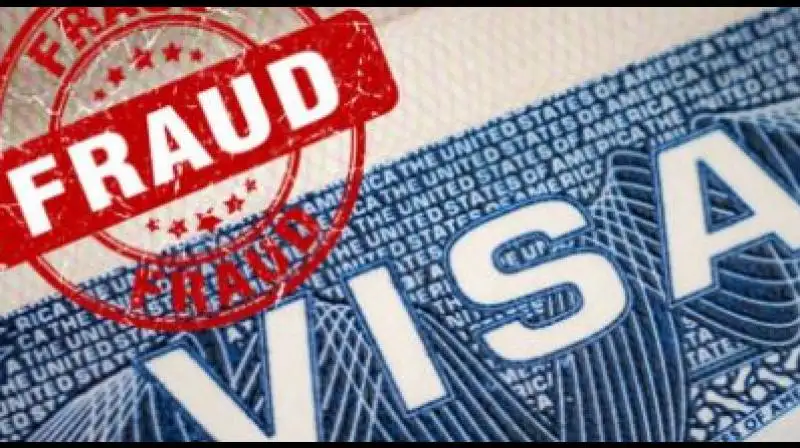Indian National Pleads Guilty in U.S. Visa Fraud Scheme: Co-Conspirator to Follow
An Indian national has pleaded guilty to orchestrating a visa fraud conspiracy that targeted the U.S. immigration system. The accused, identified as Patel, admitted his role in the scheme during a court hearing. Authorities had charged him in December 2023. His co-conspirator, Singh, is expected to plead guilty on May 22, 2025.

Fraud Scheme Exploited the H-1B Visa Process
Patel and Singh took advantage of the H-1B visa system, which allows U.S. companies to hire foreign workers in specialized fields like IT, engineering, and healthcare. Prosecutors stated that the duo submitted false visa applications containing misleading job offers and fake employer-employee relationships.
Patel worked as a recruiter and business operator. He created deceptive job listings, falsified company records, and helped submit fraudulent documents. These actions made it appear as though legitimate job opportunities existed for foreign workers, even though they did not.
Their scheme not only manipulated the immigration system but also placed unsuspecting applicants in risky legal situations. Many of these workers believed they were following a legal process.
Patel Admits to Conspiracy Charges
Patel pleaded guilty to conspiracy to commit visa fraud, a federal crime with serious consequences. He acknowledged that he had submitted numerous false petitions to U.S. Citizenship and Immigration Services (USCIS). He often used shell companies and fake contracts to support these applications.
According to the Department of Justice, Patel enabled dozens of foreign nationals to enter the U.S. illegally. He charged large fees for this service, sometimes collecting tens of thousands of dollars from a single applicant.
Patel ran this operation for several years and made significant profits by exploiting people eager to work in the United States.
Singh’s Guilty Plea Expected Next
Singh, the second person involved, is scheduled to appear in court on May 22, 2025. Prosecutors believe he will also plead guilty. He allegedly handled job descriptions, payroll documents, and communication with immigration agencies. Singh worked closely with Patel to maintain the appearance of legitimate employment offers.
If Singh pleads guilty, both men could face sentencing later this year. U.S. sentencing guidelines allow for several years in prison for conspiracy to commit visa fraud. If either man lacks U.S. citizenship, they may also face deportation after serving their sentence.
Case Adds to Growing Scrutiny of H-1B Visas
This case adds to a growing number of investigations into H-1B visa abuse. While the visa program aims to bring skilled workers into the U.S., some companies and recruiters have misused it for personal gain.
U.S. authorities have increased efforts to crack down on visa fraud, especially in the tech sector. Agencies like USCIS and the Department of Labor have started using stricter review processes and conducting more audits on employers.
A spokesperson for Immigration and Customs Enforcement (ICE) praised the investigation. He emphasized the need to protect the system from dishonest operators who hurt genuine applicants and damage public trust.
Foreign Workers Caught in the Crossfire
Many foreign nationals who used Patel and Singh’s services might not have known about the fraud. Some believed they were applying through legal and trustworthy channels. Now, they face uncertainty. They could lose their immigration status or face deportation.
Immigration advocates have urged authorities to consider the role of the applicants as potential victims. If these individuals can prove they had no knowledge of the fraud, they might qualify for legal relief.
An immigration attorney who followed the case pointed out that scams like these make it harder for everyone. “Even honest applicants face more scrutiny and delays because the system no longer trusts what it sees on paper,” he explained.
Calls for Reform Grow Louder
As more cases like this one come to light, lawmakers and immigration experts continue to call for reform. They believe the H-1B program is valuable but vulnerable to abuse. Some of the proposed changes include:
- Verifying job offers more thoroughly
- Increasing penalties for fraudulent recruiters and fake employers
- Offering better support to workers during the application process
Strengthening the system could help prevent similar scams while ensuring that skilled workers still have access to opportunities in the U.S.
Conclusion
Patel’s guilty plea—and the likely plea from Singh—serves as a warning against manipulating the immigration process. Their scheme took advantage of people’s dreams, undermined legal pathways, and weakened trust in a system meant to benefit both workers and employers.
While the legal system is holding the perpetrators accountable, many foreign workers remain in limbo. This case highlights the urgent need for better oversight, stricter enforcement, and reforms that protect honest applicants from falling into similar traps in the future.






